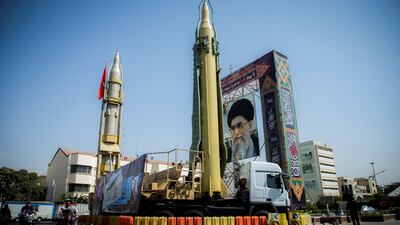Iran may have been advancing its ballistic missile capabilities in a remote desert site in the country's northeast, according to a group of US-based academics.
Weapons researchers from the Middlebury Institute of International Studies in California identified a previously unknown testing site while reviewing recent Iranian state TV broadcasts.
They then analysed satellite imagery of the facility, unearthing evidence that the site may be actively used for researching rocket designs, The New York Times reported Wednesday.
Although developing long-range missiles would not violate existing international agreements, it will likely draw the ire of the United States, and could discourage the EU from working towards a new nuclear deal, following the Trump administration's exit from the 2015 agreement.
Iran's missile programme – and its stock of such weaponry – is controlled by its Revolutionary Guard, which operates outside the authority of the government, answering directly to the country's Supreme Leader, Ayatollah Ali Khamenei.
When researchers initially identified the site, near Shahrud, northeast of Tehran, they believed it had only been used for a single missile test in 2013, as the Iranian authorities claimed. But when they examined images of the site over time, they noticed that the number of structures gradually increased, the Times reported.
They also noticed ground scars, indicative of missile exhaust blasts, a sign of final-stage testing of ballistics.
Between 2016 and 2017, the researchers also saw two craters appear in the satellite imagery a few kilometres away from the site, which they identified as a further sign of missile tests.
The Iranians, the researchers believed, had kept their research secret by working at night.
The Iranian regime denies they are developing long range ballistic missiles.
Tehran has been under sanctions imposed by UN resolution 2231, which called on the Islamic republic to refrain from ballistic missile activities including their development or testing.
__________
Read more
US sanctions five Iranians over ballistic missile deliveries to Yemen’s Houthis
US sanctions on Revolutionary Guards causes Iran investment rethink
Pompeo’s hardline stance walks a fine line between a new deal and all-out war with Tehran
__________
Mr Khamenei, who as supreme leader has been Iran's ultimate authority since 1989, maintains his country is entitled to develop ballistic capabilities for self-defence. Military officials, however, have said that they will not develop missiles with a range exceeding 2,000 km.
The new research could contradict that.
The report said analysis of the imagery suggests Iran may be developing long-range missile technology, beyond 2,000 km. Iran already possesses medium-range missiles capable of striking much of the Middle East, including Israel and many US bases.
The new research will be seized upon by supporters of US President Donald Trump.
Having pulled out of the nuclear deal early this month, his government has since imposed new sanctions on Iran. One of Mr Trump's main criticisms of the agreement was that it it failed to address Iran's ballistic missile capabilities.
While the report acknowledged that the evidence about long-range missiles was inconclusive, the researchers said recent moves by the Iranian regime could validate their theory, while Mr Trump’s exit from the nuclear deal could embolden the government in Tehran to further develop its missile programme.
According to Jeffrey Lewis, who led the research team, Iran may have have been limiting its weapons research up to now.
"The Iranians are choosing to restrain themselves for political reasons," he told the Times. “If we tell them to go to hell, we’re not going to like what they do.”

